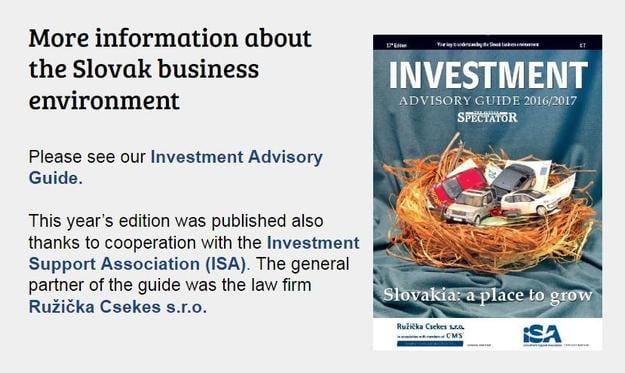This set of most frequently asked questions regarding inquiries by clients of law firms is regularly updated. Last update: February 3, 2017.
Q: When does a company have to be registered with the so-called Public Partners Registry and what are its most important duties under the Slovak Anti-Letterbox Companies Act?
Q: Why is it important to gain access to the e-box of the company and to check it regularly?
Q: What are the pros and cons of having a business licence and founding a company? What form of company should I choose?
Q: What does the criminal liability of companies mean?
Q: What does a company in crisis mean in practice?
Q: Is there a chance to recover a debt claim? How long will the process take?
Q: How do I terminate employment?
Q: When does a company have to be registered with the so-called Public Partners Registry and what are its most important duties under the Slovak Anti-Letterbox Companies Act?
A: Only those who publicly disclose their beneficial owners (being natural persons) can do business with the public sector. Local or foreign companies are entitled to receive substantial rights, goods or services or financial payments (value of a contract higher than €100,000) from the public sector only in cases where they register their beneficial owners with the respective public online register. The mandatory verification of the beneficial owners shall be exercised prior to the registration and regularly at defined “verification occasions” throughout the year by so-called “professionals”.
The main duty of the management of the private company interested in doing business with the public sector is to contract a “professional” – attorney, notary, bank, auditor, etc. and to provide him/her with the cooperation necessary for the identification or verification of the beneficial owners of the company.
Sanctions for infringement include the withdrawal of the public entity from the contract, suspension of consideration, fines, liability of “professionals”, removal of the economic profit, cancellation of the registration in the respective register, and “blacklisting” into the register of disqualified persons.
Andrej Leontiev, partner at Taylor Wessing
Q: Why is it important to gain access to the e-box of the company and to check it regularly?
A: As of July 1, the use of government e-boxes is mandatory for any company registered with the Slovak Commercial Register. For such entities, an e-box was automatically activated and the state authorities are obliged and will communicate with such entities electronically. Therefore it is necessary that the e-box is checked regularly as the state authorities may deliver into it crucial decisions. These will be deemed as delivered by their delivery into the e-box after the lapse of the stated period irrespective of the fact of whether the company has access to the e-box or not. In case the e-box is ignored, a decision may be final, without any possibility to file appeal, and imposing a duty to pay, deliver or perform something, and the company may not even know about it. Ignoring the e-box may cause irreversible damage to the company.
Michal Šimunič, attorney at ČECHOVÁ & PARTNERS
Q: What are the pros and cons of having a business licence and founding a company? What form of company should I choose?
A: The decision concerning the right type of vehicle for a particular project or business depends on various aspects related to that particular business. For example, for an individual running a local business, like a craftsperson, who is directly performing the work and does not have any intentions of expanding the business, it could make sense to keep on running the business in the form of a one-man business. In certain cases, the tax advantages or family status of the entrepreneur might be relevant as well.
In case there are more persons involved in the business and there is potential for further growth, then it would be more suitable for such a business to be carried out through a stand-alone vehicle. In most of the cases the preferred type of vehicle would be either a private limited liability company or a joint stock company. The advantages of establishing the separate vehicle include limitation of liability of the members (shareholders), ability to transfer or to increase/expand the membership (shares) in the vehicle and thus to provide the business with additional funds. The establishment of the vehicle could also be more advantageous from the tax law and accounting point of view. As it is considerably more expensive and administratively burdensome to establish and maintain a joint stock company and since there are practically no differences in the operation possibilities, most investors and entrepreneurs prefer a private limited liability company, unless the law stipulates a particular type of business.
As of January 2017, the simplified joint stock company (new legal form) enables the accommodation of the different interests of different shareholder groups and offers effective ways to agree on special option rights, including employee option schemes.
Radovan Pala, partner at Taylor Wessing
Q: What does the criminal liability of companies mean?
A: Could companies end up behind bars in Slovakia? No, they can’t – even if the new Corporate Criminal Liability Act in effect since July 2016 introduced a different approach to corporate crime. A company may be punished with one of nine possible sentences, including dissolution, ban on participation in public tenders, or a monetary penalty up to €1.6 mil. A company may be accused of over 50 possible offences, such as corruption, aggrieving the customer, unfair business practices, offences against the environment or tax and insurance evasion. All of which were chosen to be considered as corporate offences. It may be convicted directly, without the need to prove the fault of, or identify the offending individual. Even acts of ordinary employees may result in criminal liability of a company. Of additional importance is that a company may be held liable for the “sins” of another company it has acquired or merged with, since the liability for criminal offences is assumed by legal successors.
Dominika Bajzathová, lawyer at Kinstellar

Q: What does a company in crisis mean in practice?
A: A company in crisis is defined in the Commercial Code as a company which is bankrupt (i.e. if it is indebted or insolvent) or which is facing impending bankruptcy (if the ratio of its equity to its liabilities is lower than 8:100 / the ratio for 2016 is set to be 4:100 and the ratio for 2017 is set to be 6:100/). In effect, this means that the company in crisis will be prohibited, during the period of crisis, from paying out the so-called external funding, which replaces the company’s own resources, from providing company funds to its associates without appropriate consideration, etc. The statutory body of the company in crisis is obliged to take all necessary measures in order for the company to overcome the crisis. The aim is the protection of creditors as well as the prevention against “exploitation” of companies. Nevertheless, only a limited liability company, joint-stock company or limited partnership (if its general partner is not an individual) may become a company in crisis.
Galina Vlčková, junior associate at SOUKENÍK – ŠTRPKA
Q: Is there a chance to recover a debt claim? How long will the process take?
A: The chance to recover a debt claim depends not only on the court’s decision, but particularly on the existence of the debtor’s assets. Yet the effective court proceeding does not guarantee the recovery of debt claims. The chance is created by choosing contractual partners in foresight, learning about their solvency from public registers, preparing quality contractual materials or securing claims in an adequate way. The average length of a civil court proceeding was 14-16 months last year, according to the Justice Ministry’s statistics, but the time involved is actually longer. The more difficult the dispute is, the higher the risk of court procrastination, ineffective court actions and obstructions of the litigation parties. The new procedural rules offer some space to accelerate the proceedings as they move the duty to submit evidence to the litigants and limit the possibilities of courts to substitute this duty.
Katarína Kováčová, partner at Ružička Csekes
Q: How do I terminate employment?
A: The safest way to terminate employment is by a properly drafted mutual agreement, covering all outstanding rights and duties, in particular financial entitlements. This limits the threat of potential claim of the employee for invalidity of termination. If the employment is to be terminated unilaterally by the employer, a favoured option is to terminate the employment based on a decision on so-called organisational changes causing redundancy. If the employee becomes redundant due to the cancellation of their job position, such position cannot be reopened by the employer for two months following the termination of the previous employment. Of course business and life also bring situations where unilateral termination for breach of discipline or bad performance is also needed. As this is a much more challenging exercise, the golden rule in such a case should be to act diligently, have proper grounds and evidence available and to have the stamina for a potential court challenge.
Michal Šimunič, attorney at ČECHOVÁ & PARTNERS

